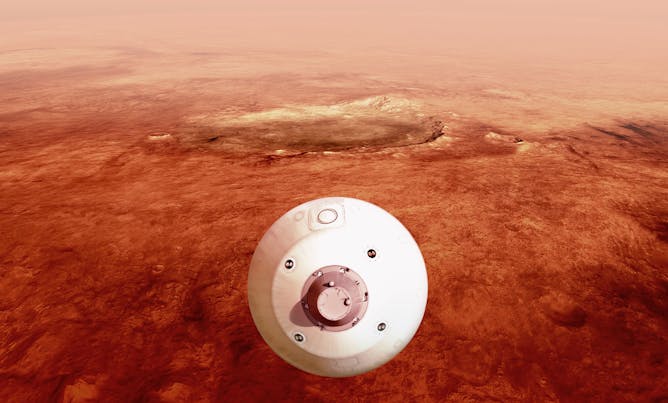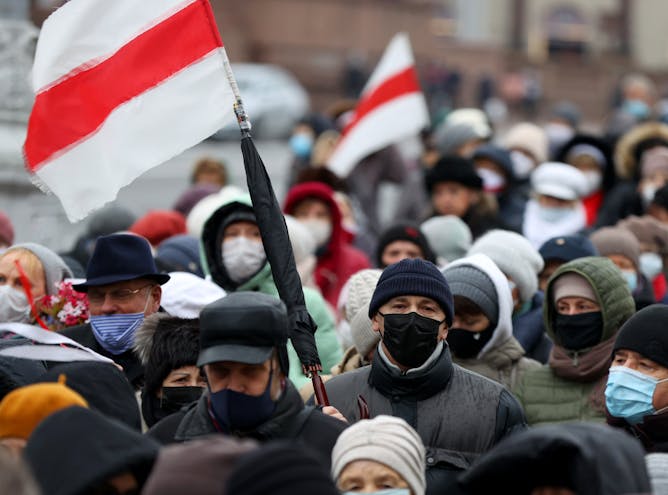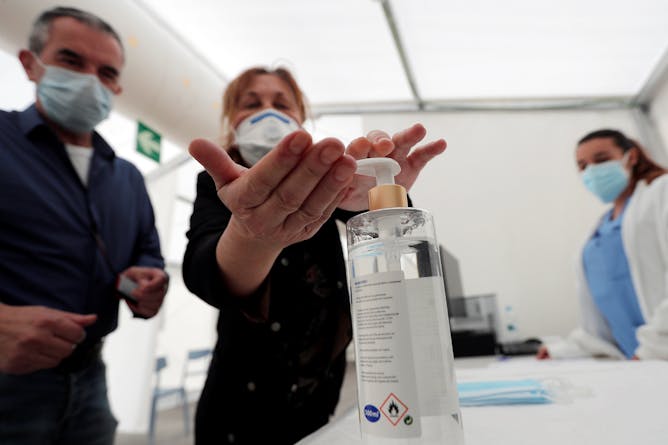|
|
|
|
When The Conversation launched in 2011, we were a small team of editors based out of Melbourne, Australia. Since then we’ve grown into a global platform with more than 120 people working in 15 countries around the world. Now, we’ve launched The Conversation Weekly, a new podcast featuring some of the best academic research and analysis from around our global network. The show is hosted by me and Dan Merino, one of our science editors based in San Francisco.
Our first episode explores why February is going to be such a busy month for Mars. Three different space missions – from the United Arab Emirates, China and the US – are due to arrive at the red planet within a few weeks of each other. It features Jim Bell, who is leading the team behind one of the cameras on board Nasa’s Perseverance rover. We’ve also got an interview with Félix Krawatzek about a new survey of public opinion in Belarus, where protests are still going on more than six months after the country’s disputed election, and the links with ongoing unrest in Russia.
You can subscribe to The Conversation Weekly via Apple Podcasts, Spotify or listen wherever you usually get your podcasts.
|
Gemma Ware
Editor, The Conversation Weekly
|

|
|

An artist’s illustration of the aeroshell containing NASA’s Perseverance rover guiding itself towards the surface of Mars.
NASA/JPL-Caltech
Gemma Ware, The Conversation; Daniel Merino, The Conversation
Plus what protesters in Belarus want to happen next. Episode 1 of The Conversation's new weekly podcast.
|

Protesters on the streets of Minsk, the Belarus capital, demand the resignation of the president, Alexander Luksashenko.
EPA-EFE/STR
Félix Krawatzek, University of Oxford; Gwendolyn Sasse, University of Oxford
Hundreds of thousands of people have protested the regime of Alexander Lukashenko over the last six months – a new survey reveals what they want.
|

Kai Foersterling/EPA
Stephen Kissler, University of Cambridge
Flu has been almost wiped out in the last year, thanks to COVID.
|
Science + Technology
|
-
Steffi Paladini, Birmingham City University
India has already managed what China has not.
-
Thomas Cheney, The Open University
The space laws designed to protect planets and moons from contamination.
-
Paul Braterman, University of Glasgow
An inevitable part of the internet age, some conspiracy theories appear and then fade, but in the US particularly, creationism seems firmly embedded in religion, education and pseudoscience.
|
|
Politics + Society
|
-
Andrew Lee, University of Sheffield; Sunil Bhopal, Newcastle University
It is a false dichotomy to judge schools as either 'safe' or 'unsafe'. The reality is more complicated.
-
Daniel Adamson, Durham University
Their crucial contribution to anti-appeasement remains unrecognised, but LGBT+ History Month provides an ideal opportunity to acknowledge this brave group of MPs.
-
Catherine Armstrong, Loughborough University
Although the terminology we now use to describe gender would have been alien in the 18th and early 19th centuries, the concepts were understood by many.
|
|
Health + Medicine
|
-
Karyn Ayre, King's College London; Abigail Easter, King's College London
It can be extremely distressing and stigmatising for a woman to experience a mental disorder around the time of childbirth.
-
Sara E Casey, Columbia University; Emily A Maistrellis, Columbia University Medical Center; Terry McGovern, Columbia University Medical Center
Trump's expanded global gag rule weakened national health systems and created barriers to women’s sexual and reproductive healthcare access.
|
|
Arts + Culture
|
-
William Sutton, University of Portsmouth
On house arrest, Xavier de Maistre took a journey around his room where he discovered there was much to wonder at.
-
Emma Bielecki, King's College London
A french classic has had a thoroughly modern update, meditating on themes of class, race and colonialism.
|
|
Environment + Energy
|
-
Anandita Sabherwal, London School of Economics and Political Science; Sander van der Linden, University of Cambridge
A new study documents the influence of Greta Thunberg on the public's motivation to act on climate change.
|
|
Business + Economy
|
-
Alexander Kurov, West Virginia University
Market prices are supposed to reflect a company's fundamental value. When they no longer do, bad things can happen.
|
|
| |
Featured events
|

|
Wivenhoe Park, Colchester, Essex, CO4 3SQ, United Kingdom of Great Britain and Northern Ireland — University of Essex
|

|
Online, Online, Oxfordshire, N/A, United Kingdom of Great Britain and Northern Ireland — University of Oxford
|

|
Online, Online, Oxfordshire, N/A, United Kingdom of Great Britain and Northern Ireland — University of Oxford
|

|
Heslington, York, York, YO10 5DD, United Kingdom of Great Britain and Northern Ireland — University of York
|
|
|
|
| |
| |
| |
| |
| |
|
|
|
|
|
|
|